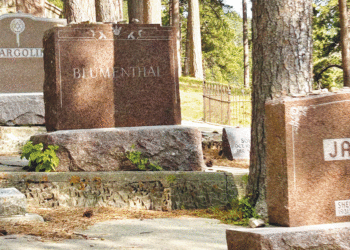The recent arrests of mayors, other elected officials and Orthodox rabbis in a New Jersey corruption investigation have been widely reported. Members of the tight-knit Syrian Jewish community in New York City and Deal, N.J., have been reeling from the revelations that several of their respected spiritual leaders may have been involved in a money-laundering scheme. (There are also lurid allegations that an ultra-Orthodox, or haredi, man has been trafficking in kidneys.)
Our sister newspapers in New York and New Jersey have been all over this story. The Jewish Week in New York recently published an opinion article by Mark Charendoff (referred to in Robert Wiener’s story on Page 5 of this edition of the AJW). Charendoff, the president of the Jewish Funders Network, also an Orthodox Jew, reflects on the ethical standards among his stream of coreligionists: “Is it possible that there is something in the Orthodox community in general and the haredi community in particular that creates fertile ground for this type of fraud? I’ve too often witnessed, here and in Israel, a perverse notion that we few who feel bound by the laws of God are free to flaunt the laws of man. That the seriousness with which we hold halacha (or Jewish law) forces us to view state law as trite, flawed — unimportant at best, a nuisance at worst.”
The arrests in New Jersey call to mind the case of Agriprocessors, the kosher slaughterhouse in Postville, Iowa, where the ultra-Orthodox former owners and managers are facing hundreds of serious criminal charges relating to violations of immigration and child labor laws. Those arrested have the legal presumption of innocence, but in the aftermath of immigration raids, the families of Agriprocessors workers, mostly immigrants from Central America, are enduring great uncertainty and deprivation.
The ultra-Orthodox, whose distinctive garb and manners set them apart, are the most visible representatives of the Jewish community. However, an outward display of piety does not necessarily guarantee that a person is upholding the high standards of our ethical tradition.
Turning to Israel, one reads about a haredi sect, the Eda Haredit, that has spurred riots over the operation of a parking garage on Shabbat. The Israeli newspaper Yediot Achronot reported that hundreds of members of Eda Haredit, “a union of anti-Zionist Hasidim,” rioted in June, throwing “stones, bottles and dirty diapers at police officers.”
I’m not an authority on Jewish law, but isn’t rioting considered a violation of Shabbat?
The situation has raised the ire of secular Jews in Jerusalem, who staged a counterprotest in Safra Square, in front of City Hall. The secular Jews decried Mayor Nir Barkat’s decision to close the municipally owned Carta parking garage on Shabbat, in order to forestall more haredi violence. Haaretz reported that one of the demonstrators held a sign that read, “In Jerusalem and Tehran they are celebrating today.”
Nitzan Horowitz, a Knesset member from the left-wing Meretz Party, told Haaretz: “Barkat bowed to pressure, but we will not. I came from Tel Aviv, where they say Jerusalem is a lost cause. But if there is no freedom in Jerusalem, then the secular in Tel Aviv will have no freedom. Jerusalem is a symbol of the ultra-Orthodox, but it is our symbol, too.”
From Jerusalem to Postville to Deal, N.J., there is obviously a problem with a segment of the ultra-Orthodox who refuse to acknowledge the legitimacy of civil authorities, or, generally, the sensibilities of their compatriots.
In the conclusion of his op-ed in the Jewish Week, Mark Charendoff writes: “Many years ago, when I first heard Rabbi Norman Lamm speak, the then-president of Yeshiva University accused his fellow Orthodox Jews of losing sight of the forest of Torah because of the trees of halacha. Those words were never more true than today. Is it really possible that we, as Orthodox Jews, believe that we can create better societies and more caring communities by avoiding raspberries for fear that they may have bugs in them while not holding ourselves to even the basic standards of law and decency? Is it really possible that we believe we are in greater danger from women appearing at the pulpit than from rabbis appearing at a perp walk? Perhaps it is time to stop waiting for the perfection of the world that will come along with the building of the Third Temple and engage in perfecting ourselves and the communities we live in.”
— Mordecai Specktor / editor@ajwnews.com



















